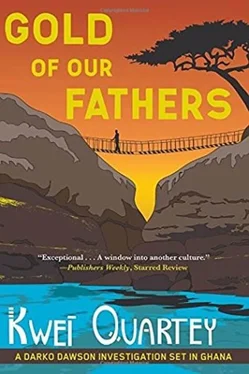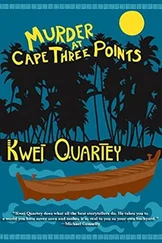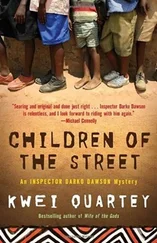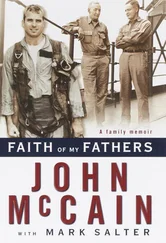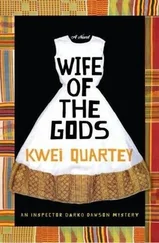“Something strange is going on, boss,” Chikata said. “Akua Helmsley said she talked to Thompson, right?”
“Correct.”
“I had a solid conversation with him. He was very cordial and open with me. You know what he told me? He said not only has Akua Helmsley never spoken to him, she has never visited PMMC.”
“What? Never? ”
“He called each of his underlings separately into his office and all of them said exactly the same thing: they have never seen the woman set foot on the premises.”
Dawson frowned. “That can’t be, surely. You say Thompson didn’t seem evasive in any way?”
“Not at all,” Chikata said. “You know, when I asked him why Helmsley would have claimed to have spoken to him, he looked at me as if I had just come from another planet and said, ‘So you don’t know about Miss Helmsley’s MO?’ ‘What MO?’ I asked. ‘Miss Helmsley either deliberately makes up her facts or gets them wrong,’ he said.”
“Can he prove that?”
“The network was down for the moment,” Chikata said, “so he couldn’t get access to her articles, but he said several of the figures she cited in her article were wildly inaccurate, and on occasions when he’s tried to call her to object, she hasn’t taken his calls.”
At first, Dawson had been certain Helmsley would not do something like this, but now he was wavering. Could he have over-idealized her? What if her zeal for the truth had slipped down a slope of fabrication?
“So then I asked him about Helmsley’s claim about the PMMC and the Ministry of Lands, Forestry, and Mines,” Chikata continued, helping Dawson to focus, “that they use illegal gold earnings to inflate the official revenue figures, and he began to laugh. He said the idea is so ridiculous that if Helmsley publishes that she’ll be laughed out of town.”
Dawson remembered that he himself had been skeptical when Akua had stated the accusation to him, and he began to feel uncomfortable, experiencing doubts about her.
Chikata continued. “And then Thompson made another comment that he was almost certain that if Helmsley really has a so-called inside source, it’s probably one of the three disgruntled employees they’ve sacked in the last year or so.”
“Who are they?”
“Thompson gave me the names and contact phones, so I’ll get onto that and see if I can interview them.”
“Good work, Chikata. Thanks.”
“Welcome, boss.”
Dawson was lost in thought for a moment. What Chikata had just told him was bothersome. “How are things with the new boss?” he asked, perhaps just to get away from the pondering for a moment.
“Hm. I wish my uncle was back.”
“That bad?”
“Not terrible,” he said, “but not great either.”
“You were spoiled by your uncle, don’t forget.”
“You always say that,” Chikata grumbled.
“Because it’s true,” Dawson said, laughing.
A moment after he had ended the call to Chikata, he received one from Commander Longdon. “You are summoned to Kumasi Regional Headquarters for a meeting,” he said.
He sounded grave, and Dawson had a plunging feeling in his stomach that he was in trouble. Again. “Summoned, sir?”
“Yes. So as not to waste time, I have sent my driver to pick you up. Please go with him as soon as he arrives.”
“Yes. Yes, sir.”
The vehicle was an SUV manufactured in India. Dawson sat in the front next to the constable driver and chatted casually all the way to Kumasi Regional Headquarters, belying his anxiety over what was going on. His stomach fluttered nervously. Was he in trouble, or was it something else? He searched his mind for some breach he might have committed. Was it the way he had engineered Chikata’s temporary transfer to Obuasi? No, that was unlikely, because Chikata’s uncle had played some part in that, and as Assistant Commissioner of Police, Lartey was highly placed. Dawson gave a mental shrug. Nothing could be done except to wait and see.
The meeting room was on the second floor of the sprawling Kumasi Regional Headquarters building. At the top of the flight of steps, Dawson faced the door marked regional commander.
He took a breath and knocked. When he entered, he saw Longdon sitting at the conference table with three other people, one of whom was Deputy Commissioner of Police Deborah Manu, one of the very few female regional commanders. She was sharp featured and thin. The second was the rarely seen Commissioner Fortune Dzamesi, Director General of CID. Dawson did not recognize the third person, however. Dressed in a camouflage uniform studded with medals, he was obviously military.
Dawson’s forehead became clammy with a light sheen of sweat. This is even worse than I thought. What have I done? He was fearful, not of them, but of his imminent fate. He had fleeting visions of his family’s marginal assets dwindling to a trickle or nothing at all as he endured unpaid leave, and struggles to take care of the boys’ schooling, food, and health.
Stopping about a meter away from the table, Dawson braced in salute of his superiors, stiffening with closed hands to his sides, knuckles forward.
“Please,” Longdon said deferentially to Commissioner Dzamesi and DCOP Manu, “this is Chief Inspector Dawson, our new chief crime officer at the Obuasi Division.”
“At ease, Dawson,” Dzamesi said with flick of the hand. “Have a seat.” He indicated the only empty chair, and Dawson took it, looking from one solemn face to the other. They each had important-looking three-ring binders in front of them.
“I have to warn you, Chief Inspector,” Dzamesi said, “that this is a top secret meeting. Everything we discuss here must stay in this room. Is that clear?”
“Yes, sir.”
“Those you see around this table, including myself,” Dzamesi continued, “are members of the Task Force on Chinese Illegal Mining. The president has given us the challenge of bringing these galamsey activities to a stop. In order to do this, we must apprehend these illegal Chinese nationals so that they may be deported immediately. And that is what we have pledged to do.”
Lofty words. Dawson had his doubts. “Yes, sir.”
The military man turned out to be Brigadier-General Frank Bediako, who was in charge of the Ghana Armed Forces Northern Command based in Kumasi. His eyes were narrow, and his jaw looked as hard as a coconut shell. “Perhaps I have missed something,” he said in a voice as raspy as sandpaper, “but remind me what the chief inspector is supposed to be contributing to this meeting-or to the task force for that matter?”
“Sir,” Manu said, shifting in her chair to look at him, “we do like to have the input of our officers who are in the trenches, so to speak, so I asked Commander Longdon to invite Chief Inspector Dawson. Perhaps you can explain a little more, Commander.”
“Thank you, madam,” Longdon said, and to Bediako, “Since his arrival, I have directed Chief Inspector Dawson in the investigation of the death of an illegal Chinese miner. Along the way he has collected a lot of information that could be helpful to the task force.”
“Ah.” The brigadier-general nodded without much passion. “Very well. Carry on.”
“There is something I want to ask you, Chief Inspector,” Manu said, turning to Dawson. “At times, when our officers have visited these galamsey sites, they have met only the absence of the Chinese men. Have you located any hiding places to which they commonly disappear?”
“No, madam,” Dawson said. “No specific hiding spots. But more importantly, if the police are meeting their absence, then could it be there are informants within the police service?”
Dzamesi stiffened. “What are you talking about?”
Читать дальше
